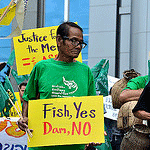Thailand
Published on Mon, 2013-09-23 09:48
The Report Collecting Inputs from Marginalised populations on the Post 2015 Development Agenda says that in the last 15 years in Thailand there has been improvement in some important social services, such as education and healthcare, and people have grown more aware of their rights. However, rapid economic growth also widened the gap between different parts of the country and groups of people in the society, leading to marginalisation and growing disparities. For many of these people life became more insecure: loss of source of livelihood (job, land, access to natural resources), identity crisis, deterioration of social relations, and disempowerment. This has been attributed by many to the economic development approach adopted over the years, which led to the commodification of natural resources and food. In parallel, public sector governance structure did not allow for significant people’s participation in the policy and decision-making processes at the local level. |
Published on Thu, 2013-03-14 21:37
The approval of the 2010-2030 Energy Development Plan in Thailand will promote energy inequality among the population and the poorest will bear the heavy environmental costs of power plants, coal plants and even nuclear reactors, undermining the achievements of the MDGs that the country claims to have achieved by 2015. Academics, civil society organizations and local community organizations have expressed their opposition, proposed a new plan based on a holistic approach to energy planning and urged to shift from the strong dependency on fossil fuel to use energy more efficiently using sources of renewable energy. The latest Energy Development Plan (2010-2030), elaborated mainly by the Electricity Generating Authority of Thailand, is strongly influenced by the demands of the automotive and foundry industries, which will lead the national development plan for the next 20 years. |
|
Thailand’s approval of the Power Development Plan (PDP 2010-2030) will not only promote energy inequality among its people and burden the poor with heavy environmental costs of power plants, coal plants and even nuclear reactors, but also undermine most of the MDGs’ achievements the country claimed to have already made long before 2015. Academics, civil society and local community organizations are expressing their opposition to the approved plan, proposing a new PDP based on a holistic approach to energy planning, and urging the country to move from heavy reliance on fossil fuels, use energy more efficiently, and convert to renewable energy sources for the interests of the majority Thai people.
|
|
Published on Thu, 2012-03-15 11:09
In terms of gender equity Thailand is slightly above the East Asia & the Pacific average, and all of its neighbours are in worse condition. |
|
Over the past 40 years, the country has undergone tremendous changes in its pursuit of economic growth, and at the local level there has been a movement away from subsistence livelihoods to an increased focus on monetary income. The main challenges the country now faces are the rapid degradation of marine and coastal resources and the multiple consequences of urbanization and industrial and tourism development. The unsustainable development models in use are placing a tremendous strain on the limited marine and coastal resources and the livelihoods of small-scale fishers, while policies and legislative, institutional and operational frameworks fail to support local communities in exercising their constitutional rights.
|
|
Thailand’s Supreme Administrative Court decisionupholding a lower court injunction, which suspended work on 65 of the 76 industrial projects in the Map Ta Phut Industrial Estate due to environmental concerns, supports the constitutional rights of individuals to safety and good health. The injunction exposes the failure ofState agencies to issue proper operating licenses for industrial projects.Thailand must embark on a complete rethinking of its industrial development policy, addressing its economic problems and generating employment while not damaging people’s health and the environment.
|
|
The Government has issued a prompt response to the crisis under the usual shape of stimulus packages. However, a more sustainable vision becomes mandatory: one that brings into the solution the environmental and food security concerns the country and the world are currently facing. If change is to happen, it will have to come from an invigorated social movement, backed by solid support from academics and entrepreneurs.
|





